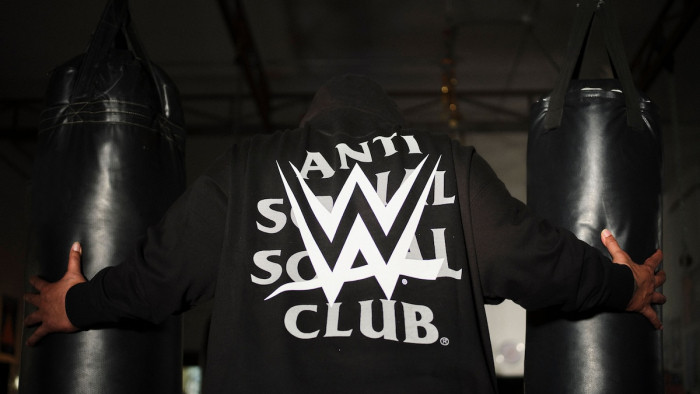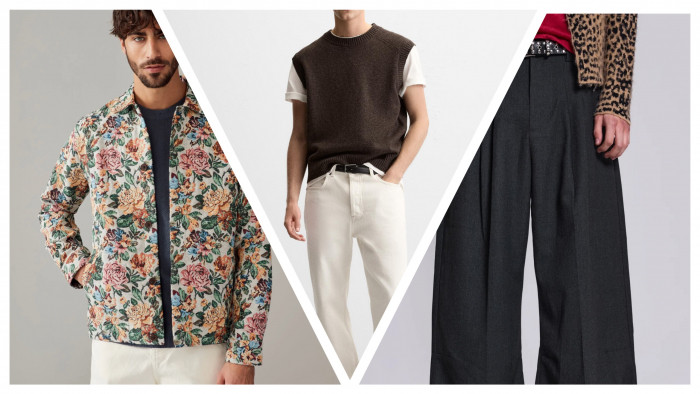"I don't even know I'm doing it, it's like breathing": What makes a modern addiction?
Exploring the realities of addictions to online porn, working out, tattooing, trainers, gaming and more


Addiction is about control, it’s about choice. I’ve had people contact me because they’re obsessed with motorbikes, but it isn’t affecting their lives financially. The scale increases when the people around you begin to be impacted by it: when they don’t see you anymore because you’re never off Facebook or porn sites, or whatever it may be.
That isn’t just a healthy interest; that’s when it starts to affect your ability to go to work, to function on a daily basis. Kids in South Korea are having anxiety attacks in the street because they’re away from their consoles. Addiction is when the choice has been removed.
-Mike Delaney, Addictions specialist
Addicted to being addicted

As an uncorrupted prepubescent oblivious to the nefarious hobbies that tempt adults, I was gripped by an innocent but still crippling addiction: transfer rumours. The secret of early-internet pre-fake news (but definitely fake news) transfer rumours was telling 11-year-olds exactly what they wanted to hear. Credible sources were saying your favourite player was poised to sign for your club. Of course, these transfers never materialised, and I must have caught on after a while that it was nonsense, but that didn’t stop me dreaming, willing them to be true, sneaking out of lessons to use the computer, staying up till the wee hours on our slow-as-all-hell PC, ravenously hitting refresh to get a sweet hit of Gunners In Sensational Ronaldinho Swoop. That felt like addiction.
I lie to myself that I’m older, wiser these days, but social media fulfils that dependency now. Only, as well as my carefully curated timelines telling me exactly what I want to hear on politics, Brexit, Italo Disco, Love Island, it also tells me the precise opposite of what I like to hear, and I love that, too. I need affirmation and I need righteous indignation, ideally both at once, and I’ll keep scrolling until I find it. That feels like addiction.
I bore deep into YouTube rabbit holes until the abyss is staring back at me, and the abyss’s face is the classic Nineties TV blooper ‘In the stocks – Bobby Davro’s faceplant almost kills him’, where Davro falls headfirst into a studio floor while trapped in a pillory – only someone’s edited it to give it a ‘vaporwave aesthetic’ and set it to loop. I watch this for five, maybe 45 minutes. That feels like addiction.
I go months without buying clothes, convince myself that I’m not suckered in by fashion anymore, that I’ve got enough of that now. And something catches my eye. I browse until I find it, um and ah, and then finally buy it. And then I think: wouldn’t that look good with those other things I saw while I was browsing? Then I end up opening enough tabs to drain Google’s servers dry, with Greece’s deficit worth of garb at checkout. That feels like addiction.
The opposite is true with every other purchase. I think to myself, I’d quite like a Kindle. Then I go to buy a Kindle and I’m overcome by a curious pre-buyer’s remorse. What if the Kindle sucks and is a complete waste of money? And so I scour review sites until I unearth someone saying that there’s some minor defects, stuff that I will never understand, but have convinced myself that I care about. And then I breathe a sigh of relief, and I don’t buy it. I think I do this so I can still fantasise about owning it, so the illusion isn’t ruined by the reality. That feels like addiction.

Most shamefully, after casting it off at the height of its popularity and being able to sneer at those that had been suckered in by a child’s mobile game, I’ve got back into Candy Crush recently. I don’t know why. It was something to do while I was waiting for a train and had nothing to do. Now I play when I have plenty of things to do. I did 95 levels last week. That definitely feels like addiction.
These all have the thin veneer of being thoroughly modern addictions. They involve screens and Wi-Fi and pressing buttons and microtransactions. But they’re rooted in something that’s been true since Neanderthals realised they could keep humanity going by rutting away and that it’d be a laugh to draw on cave walls. Life is very long, perhaps too long – or at least long enough to want to find things to distract yourself from it.
We may all be dying, but not before we kill all our free time first. The internet is a beguiling call to another life, and we are addicted to its sweet siren.
-Tristan Cross
Addicted to online porn

It began when I was 15. There was no internet then. A lingerie magazine would have been enough. It became a compulsion to objectify and fantasise about women.
As years passed, it got worse. It reached the point where I felt I was living a double life. I thought I was a decent person on the outside but had this ugly secret that filled me with toxic shame.
The invention of the internet was like pouring gasoline on it. It made it easy to feed my disease. At its worst, I’d look at porn for three hours a day. I was distant with my wife and found it hard to be intimate as I was living in a fantasy world.
I never wanted to accept I was an addict. But that’s what I had to do – not least to save my marriage. Three years ago, I started going to the Sex Addicts Anonymous recovery programme. I spoke to others and realised I’m not alone. I’m not defective. I’m not a bad person. I have a disease.
The programme helped me understand what was behind this compulsion. It’s about how we deal with resentment, anger, frustration, boredom. Recovery is about learning how to deal with them in a healthier way.
It’s important for me to state that porn addiction symptoms can be much milder than mine. But make no mistake, it’s a disease that affects the mind, body and spirit.
If you suspect you have an addiction, don’t be afraid. Go to a meeting. Living in the shadows is so damaging to your mental health. I finally feel free. For the first time in my life, I can truly say I’m happy.
-Kent, 59, from Phoenix
Addicted to working out

I was a skinny teen and hated my body. I saw the covers of Men’s Health and Flex and wanted muscles like those guys, so I started lifting weights. But it wasn’t enough. I began taking steroids; the biggest mistake of my life. I can now tell you, they have rendered me infertile.
I’d gone from 13 stone to 21 stone. I was only 21. It took over my life. I couldn’t go on holiday for fear there wouldn’t be a good gym. I didn’t even visit my parents. What I saw in the mirror wasn’t what anyone else saw.
This came crashing home one day, while walking through a shopping centre. I noticed kids were pointing and staring at me because I looked like the Incredible Hulk.
I caught a glimpse of myself in a shop window, and the penny dropped. I looked ridiculous. I realised I was never going to get a job in the City looking like this.
In the end, I went to see a therapist, something I should have done at the beginning. It took me a while, but I’ve found a balance. I now do moderate exercise to stay in shape.
Still, I am an addict. And like all addicts, it’s something I have to be aware of for the rest of my life. I’m just lucky that my wife is so understanding. I need her for many things, not least to save me from myself.
-Gareth, 37, from London
Addicted to matching

I started using dating apps around the time Tinder came out in 2012. I was using them for about five years before I realised I had a problem. They kept getting more exciting. Each – Hinge, Happn, Loveflutter – had a new gimmick.
There’s such an addictive element to getting the alerts. I would swipe and it didn’t matter who I was looking at – I wasn’t even reading the profiles. I thought of it as a numbers game. It gave me a psychological boost every time I matched with someone. It always got me excited; it’s being wanted. I liked that.
I’d gone into it thinking that it would supplement my dating in real life. But towards the end, I wasn’t putting myself out there away from the apps. I ended up leaning on them more and more until I thought, “This is not how I’m going to find something meaningful.” It was affecting my mental health because whenever I got a connection, I’d immediately want to check it out. It started to consume all my time. I’d wake up with Tinder and go to bed with Tinder. I was making small, superficial connections and was addicted to the game. I had hundreds of matches, so many that I wasn’t looking at them. It truly had no meaning any more.
Shortly after I said ‘I’m finished’ and went cold-turkey, I met the woman who’s now my wife. Putting away the apps and focusing on what I was looking for enabled me to open my eyes and be ready for connection.
-Sam Rega, 32, from New York. Rega is a director, producer and editor. His latest documentary is called Breaking The Bee
Addicted to tattoos

-Dan Felton, 29, is a model and tattoo artist at Sang Bleu in Dalston. He got his first tattoo at 17 and hasn’t stopped since
I knew from day one that I wanted to be covered in tattoos. My first tattoo was a big dagger on my calf. It felt like a long time coming. I remember quite vividly the day after it was done, bugging the guys at the shop to do more. I was hooked. Even now when I look in the mirror I don’t see someone covered in tattoos; I just see the gaps.
Seeing the finished tattoo is the fix. I don’t do it because I Iike pain. In fact, I fucking hate getting tattooed. The skull on my ribs and the ones on the palms of my hands were the most painful. I don’t chase the pain. For me, it’s the feeling of looking at the tattoo afterwards. It’s about feeding that urge.
I’ve never regretted a tattoo. Maybe because they’re all memories. I’ve got some really shoddy stuff on me, like the ‘bad luck’ one on my stomach. But it reminds me of times hanging out after work, tattooing each other, so I don’t regret it. My hand is covered in ones like that.
There’s definitely a limit. I’ve got a tiny dot under my eye and a cross on my ear, but I won’t get anything else on my face or the sides of my head. I’ve got nothing against it, but personally I don’t like the look. I don’t think I’ll ever stop getting tattoos, but you can always go overboard in anything.
Addicted to convenience
[Stands up from a plastic chair in church hall]: “Hello, my name is Jonnie…and I am a convenience addict.”
The other day I was waiting at a bus stop when I saw that a single minute had been added on to my journey. I felt the shock of the fall and, with no reflection, cut my losses and summoned an Uber, which rolled up in about as much time as it took the bus to turn up.
A day later, in Iceland (frozen food empire, not landmass) I was buying chicken dippers when I found myself labouring behind two other idiots also queuing to pay for sacks of mechanically separated meat. The wait seemed so overwhelming that I instantly ditched the dippers and got straight outta Compton, Deliveroo’ing myself a pizza before I’d even hit the conveniently placed automatic doors.
Alongside such highs as these comes Amazon, which has stripped me of my prime and my pockets, and Google Maps, which has robbed me of the journey, turning me into an end-gaming husk. The only sightseeing I do now is on my screen, with its taunting red-pin destinations and glowing blue paths.
Perhaps my addiction is not to convenience, but to freedom from responsibility. “There are always two paths to take. One is easy, and its only reward is that it’s easy,” somebody once said. And where did I get that quote? Google.
-Jonnie Bayfield
Addicted to trainers

-Alex Powis, 30, is a trainer collector and co-founder of cult streetwear blog The Daily Street. In his 14 years of collecting, he estimates he’s spent more than £8k on shoes
If I find anything interesting, I collect it. When I was a kid, it was keyrings; I had hundreds. Now I buy running shoes, but not to run in. That’s the torment; knowing you have the best running shoes on the market, but not wanting to trash them. I keep my first pair of UltraBOOSTs for style, then I have another pair to run in.
I rarely wear a lot of my shoes. Some aren’t even in my size. I have a pair of Nike SB x Air Jordan 1s that were a gift and they came in this crazy presentation box. They never leave the very back of my cupboard. I used to have a wall of shoeboxes in my room, but I didn’t want them leaning over me while I slept.
No one’s ever told me I have a problem – not seriously, at least. It’s probably because I turned it into my job. I like documenting the history of these brands; I bought my Lance Armstrong LIVESTRONG Lunarglide 4s at Nike WHQ in Portland when the doping scandal was kicking off, just before Nike dropped him.
I’m holding on to bits of history. I recently read a description of hoarding and thought, “Shit, I fit the bill,” so I decided to sell some of my shoes. There are some I’d never sell, though. I have a pair of the first Flyknit Trainers, made for the US Olympic team to wear on the podium in 2012. They’re so rare, most self-proclaimed sneakerheads have no idea what they are. I like that.
Addicted to gaming

-Eytan Alexander – CEO and Founder of UK Addiction Treatment Centres – on his experiences with video-game addicts
Our treatment centres get about 10 enquiries a day. All of them are from loved ones, never the person of concern. The person at the heart of it is in self-imposed isolation. They’re often suffering from fatigue, headaches and, in some cases, poor hygiene and a loss of appetite. For these people video games come before everything else.
It’s not about the amount you play, it’s about the extent to which you can’t stop playing. So if you had a free weekend and you wanted to play for 12 hours and you knew you were going to do that, it’s not addiction. What’s different is if you thought you were going to play for a couple of hours and it ended up taking over your whole weekend.
You might have a job, go to work and pay your bills. But all of a sudden you’re not going to work, you’re playing the game. Then you lose your job and can’t get another job because you’re putting the game first. Then your electricity is cut off. When you can’t stop and you are physically unable to score, you might do things that you thought you’d never do to score again.
We treat gaming addictions the same way as we would any other addiction. The gambling addict makes changes such as, “I’m only going to bet on horses not football anymore.” It’s the same thing with gaming: players put down Fortnite and pick up another game, otherwise there’s nothing else to fill that void. Then they haven’t addressed the problem, they’ve just kicked it down the road.
Whether it’s addiction to drink, drugs, gambling, food, sex or gaming, these things change the way you feel. If something’s happened – a trauma, or you’re being bullied at school or work – you can go into a virtual world and you’re in a community where you’re accepted and part of a team. Being in that community can normalise it for hardcore gamers. It’s validating, which is quite an addictive feeling.
People produce games to make money, so if you buy games these days, you’ll know there are add-ons you buy that help you get further: better shields, better armour, better weapons. If people aren’t playing to the level they want to play at, they can become depressed and they’ll keep spending money until they are, just as a gambler begins chasing his losses. It’s a progressive illness.
There is no awareness about video games. A parent might think, “My kids are addicted to Fortnite” but they let it go on because it seems that so many other kids are the same and it’s just what they do. I’d like to see guidelines put in place. It’s about raising awareness and that should come from the government. Look at cigarette packets – who did that? Well, it wasn’t Marlboro.
Addicted to scrolling
I don’t even know I’m doing it. It’s like breathing. Or growing hair. Or suspecting that the bass and drum players in Kasabian are being held hostage in the band by the other two. It’s just happening, to me more than with me, happening all of the time. I am scrolling.
Remember how, in early Nineties sci-fi drama Quantum Leap, Dr Sam Beckett would find himself suddenly transported into someone else’s body and exclaim, as was his hokey custom, “Oh boy!”? That’s how I find myself scrolling. One minute I’m working or watching a film or feeding a child whose survival is completely dependent on my full attention, the next I’m sitting on the toilet, listlessly scrolling through Facebook, Twitter or Google, unsure how I got there, or how long ago, as though time for me is completely immaterial. Oh boy.
And for what? Only rarely is there a clear and totally rational objective, such as, say, reading the news, checking the weather or trying to find photographs of a girl I briefly went out with at A-level college in the hope that the guy she eventually married has skin so red and tight he looks like a walrus straining to shit into a cup even though he’s only 35.
The rest of the time, scrolling is an impulse, a thumb-jerk reaction, the mind’s attempt to fill the tiny increasingly frequent moments it finds itself vacant and drifting with temporary distraction, fleeting companionship or instant enlightenment. Scrolling is a modern allergic reaction to briefly feeling alone. And this is a treacherous path because you can carefully curate a feed as much as you want, but ultimately it’s a street of closed doors and you’re knocking. You never know who is in. Yeah, it’s going great when it’s a woman with a smart reappraisal of Patrick Swayze’s Road House. Or a dog that sounds like it’s saying ‘scrambled eggs’ every time it growls. But wait a minute, who is this guy, with his tedious ruminations on how the absence of a Psittacosaurus ruined Jurassic World: Fallen Kingdom? And why is he interrupting a conversation about shoes between two strangers to say he doesn’t think gays should be able to own cars!?
That’s what you get when you stick a load of disparate people together. Madness. Narcissism. Objectionable bilge. But behind the odd door, a brilliance that makes it seem worth it. That’s why I do it, whether I know much about it or not.
-David Whitehouse
(Illustrations: Tim McDonaugh, other images: Getty)








